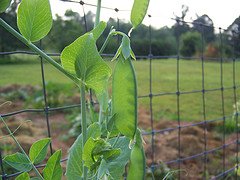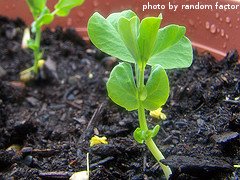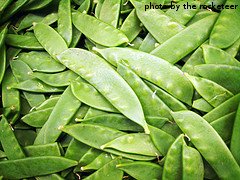Fertilizing and Watering Peas
Regularly watering peas will help them grow large, succulent pods. Pea plants have a shallow root system, so they don't do a great job at absorbing moisture from the soil. Most pea plants will do fine without fertilizer, especially if they are growing in nutrient-rich soil. However, they can benefit from a small dose of liquid fertilizer when the seedlings first emerge, just to give them a head start.
Watering Peas

It's best to water pea plants at least one a week with a deep soak, depending on the rainfall and temperatures in your area. Try not let the soil dry out completely. Very dry soil will negatively affect production. Pay special attention to when the plants are flowering and again when they are producing pods. This is the critical time when the plants need water the most. If your peas got started a little late in the year or hot weather comes early, you'll probably need to water more often to keep the soil moist. If the pods appear and the weather turns hot, water you peas at least every other day to maintain pod production.
If using a hose when watering peas, keep the water pressure low so as not erode any soil covering the shallow root systems. A soaker hose will work fine, as will an adjustable sprayer on the end of a garden hose. Just set the sprayer to the "mist" setting and give your pea plants a good dose of water.
A layer of mulch can be applied to your pea patch. This will help keep moisture in the soil and keep down weeds. Grass clippings, chopped up leaves or straw all work well as mulch.
Fertilizing Peas

When you see the pea seedlings emerge from the soil and get about 2 inches tall, you can fertilize them once with an all purpose liquid fertilizer. This will give them the boost they need to develop tall, strong vines that will eventually support lots and lots of pea pods. Just apply the fertilizer when you would normally water your pea plants anyway.
It's usually best if you only fertilize peas this one time during their life cycle. If you apply too much fertilizer, the plants will develop huge vines and leaves at the expense of pod production. If the soil in your garden is already rich with nutrients, you can get by with not fertilizing peas at all.
If you want to grow peas organically, work some compost or well rotted manure into the soil before planting. This will be more than enough to give your pea plants the nutrients they need.
Now that you know about fertilizing and watering peas, it's time to think about harvesting them.

Click here to learn about harvesting peas
Click here for some of our favorite pea recipes
Click here to move from our Fertilizing And Watering Peas page to our Growing Peas main page
Click here to return to our Home page